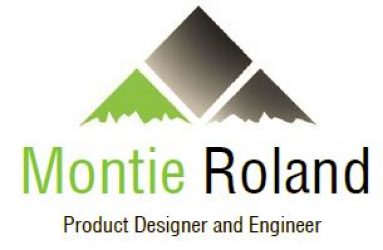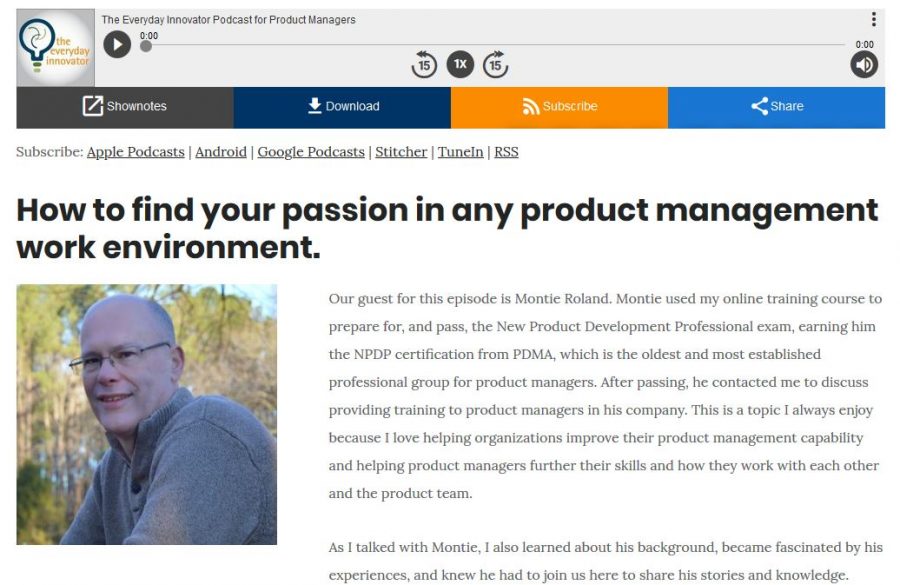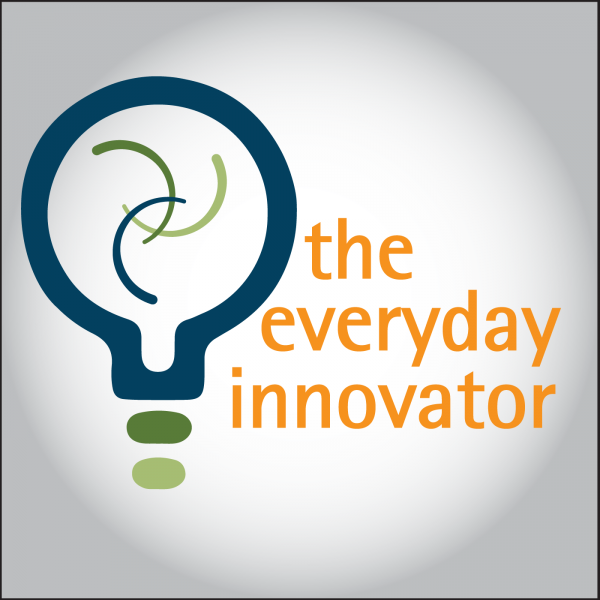I was recently interviewed for the Everyday Innovator podcast. This is a great podcast that interviews leaders in the product development and product management field. I’m honored to be included in the podcast.
Excerpts from the interview:
Our guest for this episode is Montie Roland. Montie used my online training course to prepare for, and pass, the New Product Development Professional exam, earning him the NPDP certification from PDMA, which is the oldest and most established professional group for product managers. After passing, he contacted me to discuss providing training to product managers in his company. This is a topic I always enjoy because I love helping organizations improve their product management capability and helping product managers further their skills and how they work with each other and the product team.
As I talked with Montie, I also learned about his background, became fascinated by his experiences, and knew he had to join us here to share his stories and knowledge.
Montie has pursued an entrepreneur path, building his own company, and an intrapreneur path working in an established company. He is a mechanical engineer with a ton of design experience.
We talked about his experiences, including the pros and cons of working for yourself vs working for an organization.
[3:19] What is your current role as an intrapreneur?
I’m on the new product development team at Pentair. If you’ve ever been in a swimming pool, the water probably went through one of our products. I get to do a lot of front-end work in industrial design and the connection between customer and product. The strongest part of my skillset is bridging that gap, and I have the chance to do it on a lot of different projects in a large organization.
[5:26] What kind of products did you create as an entrepreneur?
I ran Montie Design for about a decade. We started in B2B products and eventually moved into B2C. We made rack-mount servers and packaging electronics. Clients would come to us because they were trying to get around politics in their company or were behind schedule on a project. We developed products that they could transition into manufacturing. On the B2C side, we made in-home air filters that were highly stylized. We tried to make as much as we could locally so that there was a community feeling to it. We wanted people to look at our products and say that’s the way they would have made it themselves.
[13:02] What are the advantages of working on your own?
I enjoyed the sense of self-determination. You don’t have someone looking over your shoulder like you do in a big corporation. You can explore directions that you might not be able to otherwise. People who work in product development have an inherent sense of adventure, which tends to be more constrained in a corporate environment.
[14:40] What are the disadvantages of being an entrepreneur?
It requires a lot of work. If you have a spouse or family, you need to have buy-in for your entrepreneurial endeavor at home. You also need to have the funding you need and scale your operation based on the funding you have. I had a great time working on my own, but went back to the corporate world because I needed a lifestyle change. I scaled my business back as a result and now do Montie Gear on the side.
[20:45] What are the advantages of working for an organization?
I’m part of a large, multi-disciplinary team that has a lot of depth. There are times when you might have to switch projects and hand off what you’re working on to another engineer who is a better fit. Pentair fosters the sense of trust necessary to make those transitions happen. It’s also much closer to a 40-hour work week and I don’t have to worry about everything. I have a lot of people around me who are experienced at product development, which pushes me to keep my skills sharp. My colleagues and I challenge each other, which creates a very collaborative environment. I get to focus my time designing things and don’t need to worry about all the other aspects of running a business.
[25:55] What are the disadvantages of working for an organization?
There’s a lot of skepticism from companies about hiring entrepreneurs because they think you’ll get tired of the corporate environment and be out the door to do your own thing in six months. Look for companies that see your entrepreneurial background as a benefit because you can bring different skills to the table. It’s also difficult for HR to translate entrepreneurial skills into existing roles and job levels. You need to be flexible about starting at a lower rung and working your way up over time. Another disadvantage is that you’re not responsible for every decision; the scope is much smaller and you need to be okay letting go of some responsibility. There’s also a culture shift because every company’s culture is different.
[32:58] Why did you pursue the PDMA NPDP certification?
It’s easy to back off on training and certifications when you’re an entrepreneur because you’re so caught up in the day to day of running the business. In a corporate environment, you have time and money for professional development. The company wants you to grow and that makes it really easy do things like certifications.
Innovation Quote
“A candle loses nothing by lighting another candle.” – James Keller
Thanks!
Thank you for being an Everyday Innovator and learning with me from the successes and failures of product innovators, managers, and developers. If you enjoyed the discussion, help out a fellow product manager by sharing it using the social media buttons you see below.



